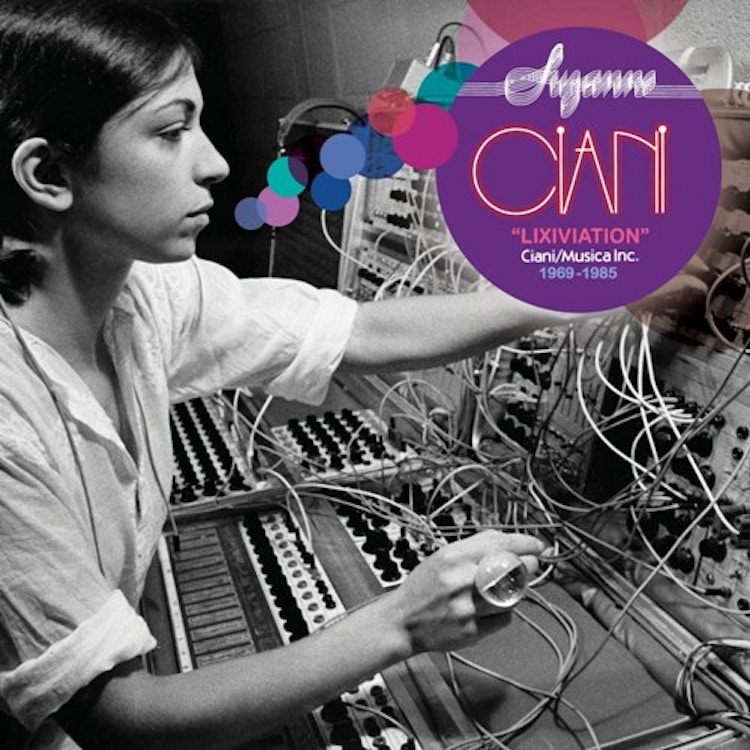"Lixiviation"

By the mid ’90s, Suzanne Ciani was “America’s First Lady of New Age music” (Sound on Sound), a guest on the Letterman show, and a multiple Grammy Award nominee. But, although the sound of waves crashing against the shore does creep in towards the end of this new release from Andy Votel’s Finders Keepers imprint, for the most part what we get here is something far stranger – and paradoxically also far more “commercial” (in the most literal sense of the term). The record covers the period from 1969 to 1985 – that’s before the album, The Velocity of Love, that would provide her first big hit, and before her first Grammy nomination – but immediately after her study with Donald Buchla at the University of California, Berkeley.
During this time, Ciani created the sound of hausfrau fembots malfunctioning for the Bryan Forbes film, The Stepford Wives; made space disco history when she collaborated with Meco on the number one album, Star Wars and Other Galactic Funk; and hit the “jackpot of advertising music” with a bit of frequency-modulated white noise that just so happened to sound like the fizz and pop of a bottle of Coke (of which only the last is here represented). Meanwhile, she found time to study at Stanford Artificial Intelligence lab with computer music pioneer Max Matthews, become the first female composer of a major Hollywood film, with the Lilly Tomlin vehicle The Incredible Shrinking Woman, and become the first female voice of a computer game when she added her vocoderised vocals to her music for pinball sim, Xenon – all while spending most of her days lugging her Buchla box from one meeting with a bewildered advertising executive to another in order to find work for her own commercial music company, Ciani/Musica.
Former tutor Donald Buchla’s “box”, one of the very first modular synthesizers, huffs and puffs on the album’s title track, the soundtrack to an abstract film of flowing mercury patterns, before pealing off in drifting, irresolute arpeggios. Elsewhere, on ‘Paris 1971′, she leaves the device to its own devices, with an Eno-esque piece of “generative music”, whereby the composer has set a kind of algorithm from which the box evolves a luxuriating bed of lulling – if somewhat disquieting – sonorities. ‘Sound of a Dream Kissing’ bloops and gurgles like an underwater theme park ride, while ‘Princess with Orange Feet’ speaks the spectral analogue language of Ghost Box affiliates like the Advisory Circle, and especially Belbury Poly. Elsewhere vocoders sing optimistic hymns to supermarket aisles and Casiotone beats patter and pulse to the rhythm of dreams.
The album’s press release would have us believe that Ciani is an American Delia Derbyshire, but it would probably be more accurate to call her a post-Fordist Raymond Scott, taking the latter’s dayglo jingles and Heath Robinson electronic idents for utilities companies and World’s Fairs into a world of hyper-complex AI technology and knowledge economy clients like ITT and Discover Magazine. If her 8bit arpeggios and LFO swooshes issue a Proustian rush to the recovered gamer, it may come as no surprise that one of her most faithful customers was the Atari Corporation. Much like Scott’s Manhattan Research Inc. before her, Ciani’s work offers a fascinating glimpse into an oft-neglected corner of electronic music history, one that is irresistibly appealing in a world of Moog fetishism and retromania. For most crate diggers, to find just one of these cuts on a second hand library music record would be like manna from heaven. Fans of the BBC Radiophonic Workshop, Ghost Box, Boards of Canada, Stereolab, Broadcast, and so on will respond to this release like mice to a cheese shop. It offers a utopian glimpse of yesterday’s visions of the future, a time when the cutting edge of experimental electronic music still had a relationship to the everyday that was both estranging, de-territorialising, and curiously warm; in comparison to which our present can’t help but seem somewhat tawdry. Hence, an invitation to dream: of a world of benevolent technology; of a beautiful pastoral vista, perfectly simulated in hologram.
Listen to Lixiviation
Get the Best Fit take on the week in music direct to your inbox every Friday

Lorde
Virgin

OSKA
Refined Believer

Tropical F*ck Storm
Fairyland Codex





